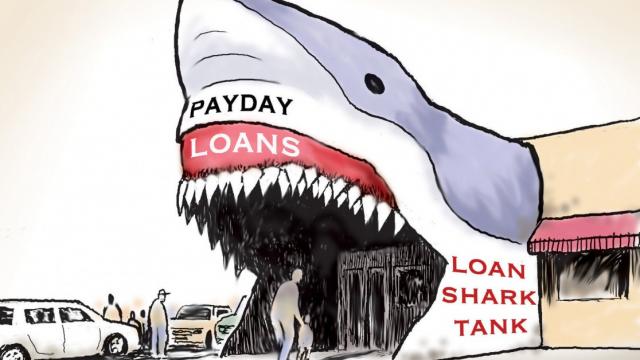
When I talked last week to Stephen Stetson, policy analyst at Alabama Arise, he was in pretty good spirits considering that the legislation he’d been pushing for months had just died in the Alabama House Financial Services Committee (HFSC) hours before the end of the 2016 legislative session.
“We got further than we’ve ever gotten before,” Stetson said. After overwhelming support in the State Senate where the bill passed 28-1, SB 91, which would have substantially lowered fees and given borrowers six months rather than two weeks to pay back loans, was sent to the House where the members of the HFSC (which Stetson calls a “notorious death-trap for reform”) were bombarded with payday loan industry lobbyists.
A weak substitute bill replaced SB 91, proposing to cap loan amounts but doing little on interest rates and nothing on the time frame of payments. Eventually, both the substitute and the original bills became moot as time ran out on the 2016 legislative session.
For Stetson, it was a familiar story in a state where private financial interests frequently hijack reforms that would help working people. In this case, it was a combination of financial pressure and petty politics that got in the way. For example, Arthur Orr, SB 91’s sponsor, angered colleagues by killing a bill that would have allocated BP oil spill compensation money, and they retaliated by filibustering a trade practices bill. Neither of these pieces of legislation was related to SB 91, but the debacle helped the clock run out on what might have emerged from the clash between the original and substitute payday lending reforms.
Meanwhile, Mike Hubbard, Alabama’s Republican Speaker of the House who is about to be tried on 23 criminal counts of using his office for personal gain, is a friend to the payday lenders and, according to Stetson, has “run the House of Representatives with an iron fist since 2010, [as] something of an obstacle” to payday loan reform.
The payday loan industry has made sure Alabama lawmakers are swimming in dirty cash, and the House Finance Committee is filled with these legislators. One member, Rep. Ken Johnson (R-Moulton) owns Trinity Financial, a commodity and security brokerage firm, and is close friends with Moulton Mayor David Grissom, who owns several businesses that do title and property loans and pawn brokerage – the kinds of businesses critics say work hand-in-hand with payday lenders to extract money from poor people.
Rep. Oliver Robinson (D-Birmingham), a former shooting guard for the University of Alabama-Birmingham and the San Antonio Spurs, not only receives yearly donations of several thousand dollars from the payday loan industry, but has also become a spokesman for payday lenders in the guise of facile “financial literacy” talks he gives in Alabama’s schools. “The financial literacy piece inoculates the lenders against their faulty product,” Stetson told me, by shifting responsibility to borrowers and obfuscating the high interest rates and unclear information perpetrated by the lenders.
Then there’s John Harrison, Alabama's Superintendent of State Banking, who Stetson says discouraged reform in a partisan manner, where “he should have been a neutral referee.” Indeed, Harrison is quoted in industry propaganda endorsing payday loans.
Of all the states ripe for change on this issue, Alabama is among the ripest. A shocking 43,000 borrowers take out payday loans every week in the state. Interest rates here hover around 455% – which means a $500 loan can end up costing $2,275 to pay back. It’s easy to say that people shouldn’t borrow the money, but statistics show that over 60% of Americans can’t afford a $500 emergency. The problem is exacerbated by the absence of banks or affordable banking services in poor neighborhoods.
The Center for American Progress concludes that payday lending undermines economic security for this growing number of vulnerable Americans. Some borrowers are especially vulnerable, such as survivors of domestic violence, who often borrow in order to escape abusive relationships, and minorities, who are explicitly targeted for loans by the industry. “Payday loans result in long-term financial hardship and pile on overdraft and other fees that put borrowers’ financial security at risk,” according Tom Feltner, Director of Financial Services at the Consumer Federation of America.
Back in Alabama, SB 91 wouldn’t have solved everything, but its extension of repayment time from two weeks to six months would have fundamentally changed one factor that often lets the economic situation for borrowers spiral out of control. “Time is the debt trap,” Stetson said, pointing out that an overwhelming amount of these loans are “repeat” actions where a borrower has to borrow again to repay a prior loan.
Meanwhile, the federal government is in no hurry to reform payday lending – politicians on both sides of the aisle take money from the industry – and coming federal regulations aren’t going to lower interest rates or make life easier for borrowers. “If you talk to a lot of the lenders, they’re not that worried” about the new regulations, Stetson said.
In the end, he believes the experience of SB 91 – both its initial widespread support, and its process-based demise – offers three important lessons for economic justice advocates:
1. Build alliances with groups you might not otherwise work with. Alabama Arise worked with conservative, faith-based Christian organizations opposed to usury and concerned about parishioners’ financial marginalization. This was “an opportunity to build non-traditional alliances with groups we may not otherwise get along with,” Stetson said. Such alliances will be critical to take down the forces of predatory finance.
2. Understand legislative committee politics. It’s not enough to understand how the legislative process works in the abstract. Those pushing for reforms must understand that each and every bill makes one or more trips through various committees, and that is where the real lobbying takes place. Stetson told me that lobbyists literally “lined the walls” of the HFSC during the work on payday lending reform, and “that's intimidating.” Understanding how committees work, and how they can make or break the lawmaking process, is critical in building mass movements to counter the effects of deep-pocketed interests.
3. Build structural, economically just and sustainable alternatives. In other words, economic justice advocates need to keep pushing for postal banking and need to support efforts to fund non-profit cooperative community financial services. “The absence of alternatives is one of the main arguments used by defenders of the status quo” in the payday lending debate, Stetson told me. While organizations like his keep tightening the regulatory screws on the industry, advocates must demonstrate that truly just and sustainable financial services can take the place of the predators.
For the time being, Stetson said Alabama Arise will focus on re-introducing payday lending legislation in 2017 – backed hopefully this time by an emergence of viable alternatives to the services – while pursuing other agenda items, including fighting Medicaid cuts, restoring voting rights for felons, and funding low-income housing. “We're going to regroup and keep at it,” Stetson said with a tired smile.
Matt Stannard is policy director at Commonomics USA and a member of the Board of the Public Banking Institute.

If you liked what you read and want to see more original reporting on Occupy.com, donate today!
3 WAYS TO SHOW YOUR SUPPORT
- Log in to post comments














